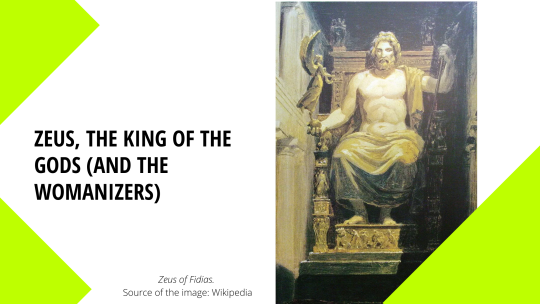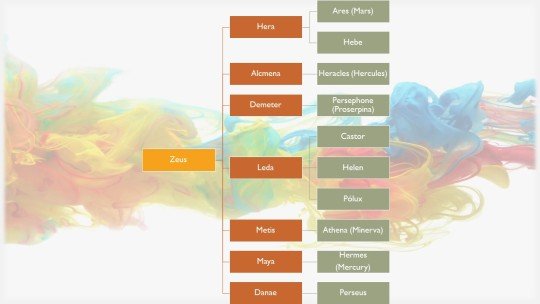Zeus, the king of the gods (and the womanizers)
Author's note: The following article was published in Spanish language in my Blurt blog on March 28th, 2021.

Banner made with Canva
Hello, my dear readers! After days without publishing almost nothing, I come back with a new article about Greek mythology, devoted to one of the most important greco-roman gods in terms of mythological content: Zeus (Jupiter among the Romans).
Who was him in the greco-roman mythology?
He was the god of light, the bolt, the field, and life. In Hesiod's Theogony he's linked with cunning and intelligence; Concepción Masiá Veriscat (2010) adds that, already among the Romans, he was also linked to truth and justice. Likewise, he was considered the patron of hospitality, of crops and the creator of the celestial bodies.
The epithet of low passions
However, Zeus was a divinity mostly known for his insatiable lust; by its result, he had numerous offspring with different women who, most of the time, became the victims of Hera's revenge. According to Gordon Cheers (2019) and Ángel María Garibay (2020), among his descendants there were divinities and demigods such as those in the following box:

Zeus also had a male lover, Ganymede, who was described as the most beautiful of the Greek boys and to whom the king of the gods himself made his cupbearer after abducting him in Phrygia.
To Garibay, Zeus was the highest epithet of the lowest human passions, such uncontrollable passions tha could take to the extreme of aberrant crimes in order to satisfy carnal needs. Panagiota Koulianou-Manolopoulou and Concepción Fernández Villanueva (2008) exemplify Garibay's statement with the attempted rape of Rea by Zeus and the fact that he took Ío by force before turning her into a calf in an attempt not to get into trouble with Hera.
Nevertheless, there was a moment when his low passions almost became synonimus with the overthrow: Hera and other gods tied him in order to prevent him from continuing being absent from Olympus. Fortunately, the rebellion did not continue due to the help of the nymph Tethys and the hecatonchian Briareo, who unleashed Zeus.
Cult in Greece and Rome
The cult of Zeus has been very widespread in Greece. For example, Zeus, under the epithet Velcanos (child) was worshiped in the caves located in Knossos, Ida and Palaicastro in the region of Crete because he had been raised by the goat Amalthea in a cave. In Arcadia, he was known under the epithet Lykáios or Lyceum (wolf), due to the fact that human sacrifices were practiced; this cult is particularly linked to the myth of Lycaon, king of Licosura, whom Zeus transformed into a wolf as punishment for the murder of a person and for his extreme cruelty (Pinto Rivas, 2019).
When Greece was conquered by the Romans in 146 b.C., the cult of Zeus moves to the Empire's capital. Under the name of Jupiter, this divinity was part of the Capitoline Triad along with Juno (Hera) and Minerva (Athena). Prayers for the protection of the city and the regeneration of the land were addressed to him (Masiá Veriscat, 2010: 49 and 50), as well as the military parades of the consuls and emperors after a victorious conquest.
Most known stories
With no doubt, Zeus is one of the most mentioned divinities in greco-roman mythology, either as the protagonist or as the character who lays the first foundation stone in the hero's adventure. Among the most known stories about this god, the following can be mentioned:
- The Universal Flood, that happens after turning Lycaon into a werewolf. Zeus, fed up with human evil and disrespect towards him and other divinities, decides to kill all human beings through the flood. Deucalion, son of Prometheus, and Pirra, daughter of Pandora and Epimetheus, survive this event; both "create" the new human race by throwing the "bones" (stones) of Gaia to earth.
- The theft of fire, mentioned before in the post Prometheus, the titan who defied Zeus.
- Athena's birth. Zeus, afraid for suffering the same fate as Uranus and Cronus, devours Metis, one of his lovers. Later, he suffers from severe headaches, so he asks Hephaestus to open his head with an ax. Great was his surprise when a young woman in armor emerged from him; the king of the gods would call her Athena.
- Europe's abduction. Europe was a Phoenician princess of great beauty. As soon as Zeus saw her, she transformed into a white bull and, after attracting her attention, he took her to the island of Crete. Some versions mention that with her he begets Minos, Radamantis and Sarpedón, three semi-legendary kings of that region.
Consulted source (Spanish)
- Cheers, Gordon (Editor). 2019. Mitología. España. RBA Editorial. English version: Mythology: Myths, legends and fantasies.
- Garibay K., Ángel María. 2020. Mitología griega. México. Editorial Porrúa. Colección "Sepan cuántos...", núm. 31.
- Hesíodo. Teogonía. España. Luarna Editorial. Consultado en: Biblioteca electrónica del Municipio de Ataun, País Vasco. English version: Sacred Texts.
- Koulianou-Manolopoulou, Panagiota, y Fernández Villanueva, Concepción. 2008. "Relatos culturales y discursos jurídicos sobre la violación", en: Athenea Digital. Núm. 14. Pp. 1 - 20. Obtenido de: https://doi.org/10.5565/rev/athenead/v0n14.470 .
- Masiá Veriscat, Concepción. 2017. Mitología romana. España. Albor Libros.
- Pinto Rivas, Victoria E. 2019. "Los orígenes mitológicos del vampiro y el hombre lobo (I): Licaón y Lamia", en: Steemit. Consultado el 28 de marzo de 2021.
- "Zeus", in: Wikipedia. Consulted on March 28th, 2021.
Mythological notes
- Greco-roman mythology: A brief introduction.
- Greek and Roman Mythology: Their differences.
- Creation, according to greco-roman mythology.
- Gaia and Uranus, the primordial divinities.
- The Titans, the predecessors of the gods.
- Titanomachy: Titans vs. Olympians.
- Prometheus, the titan who defied Zeus.
- Pandora, the lady of the amphora.
- The Twelve Olympians: From Greece to Rome.